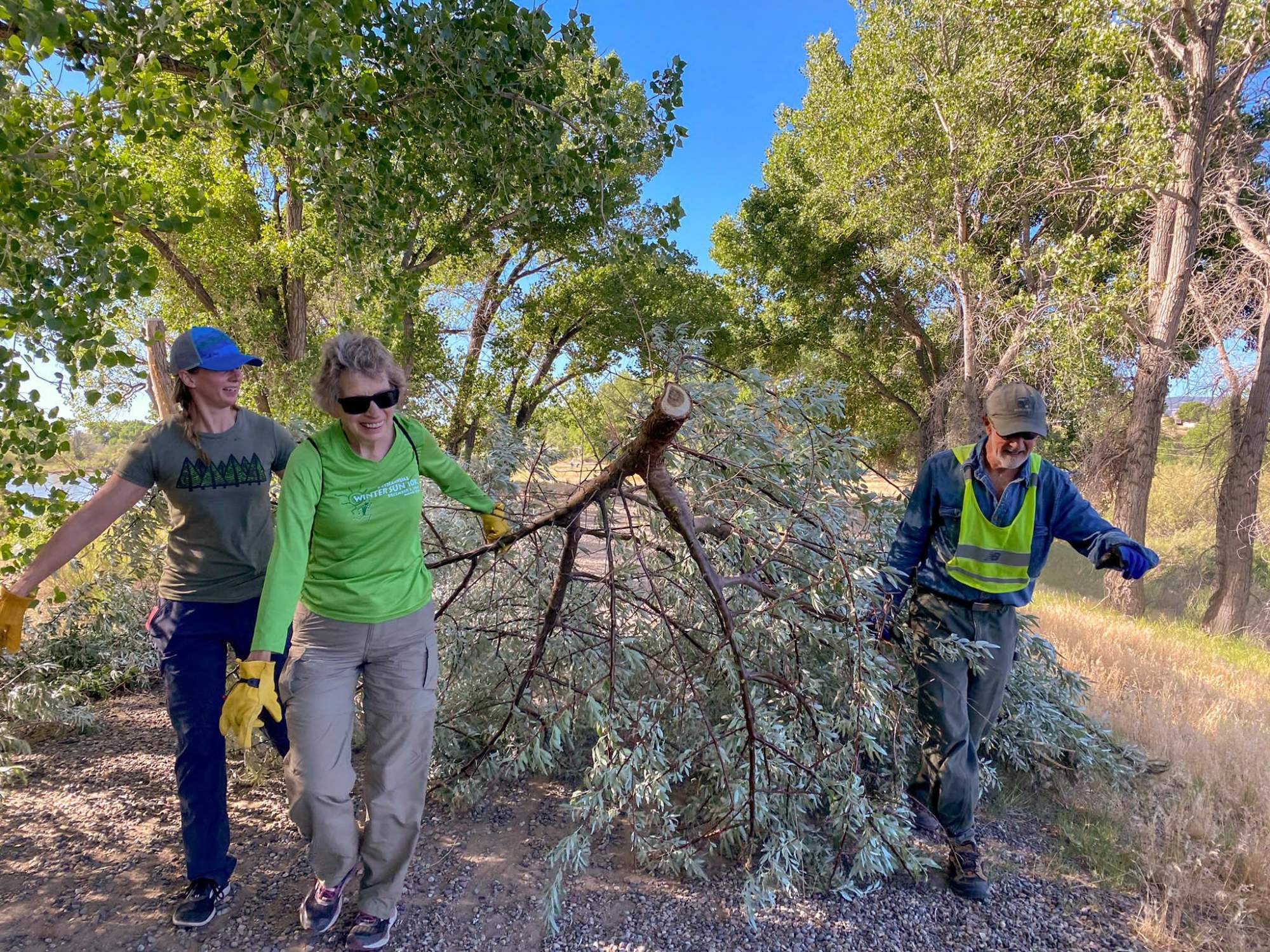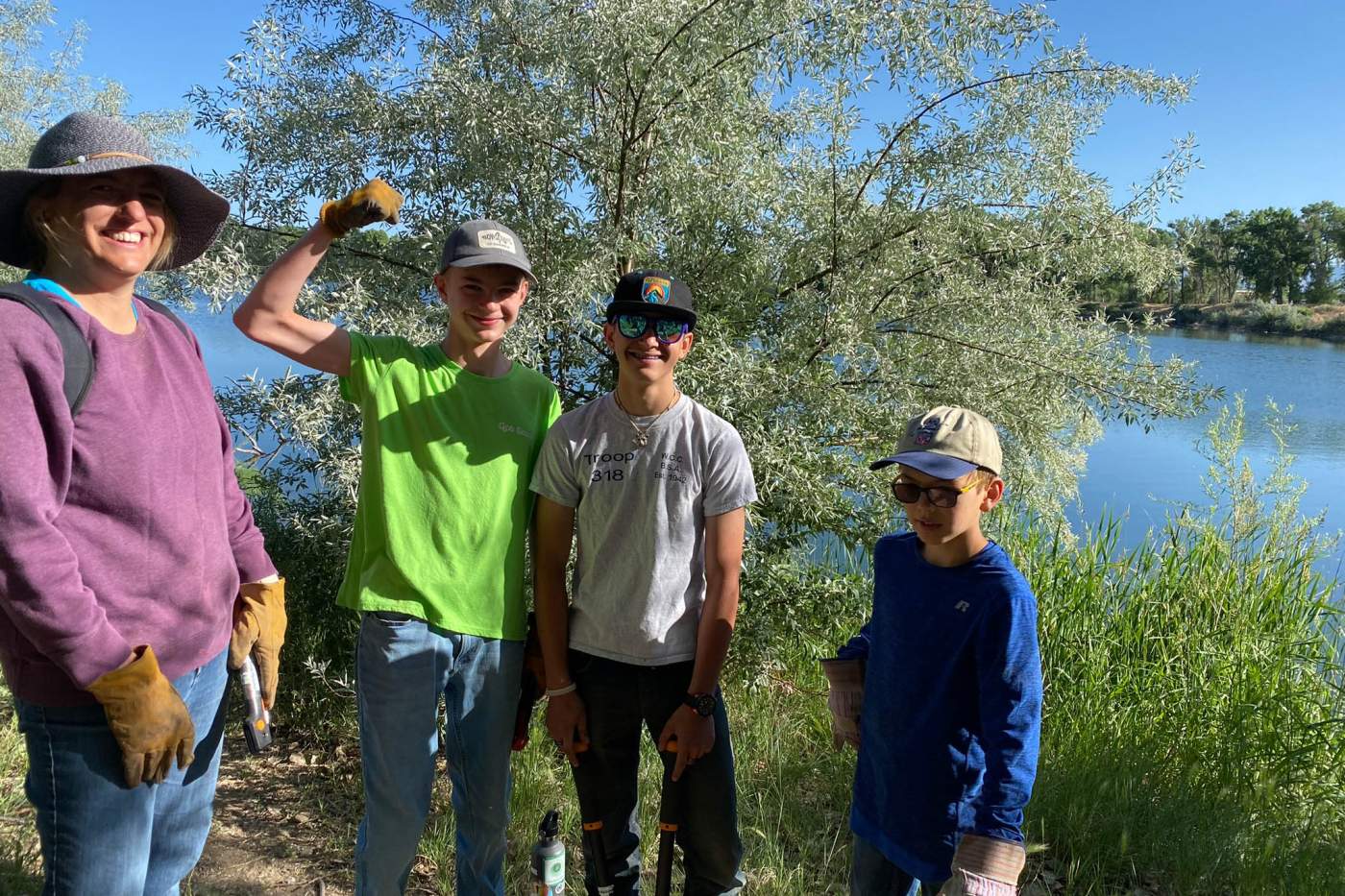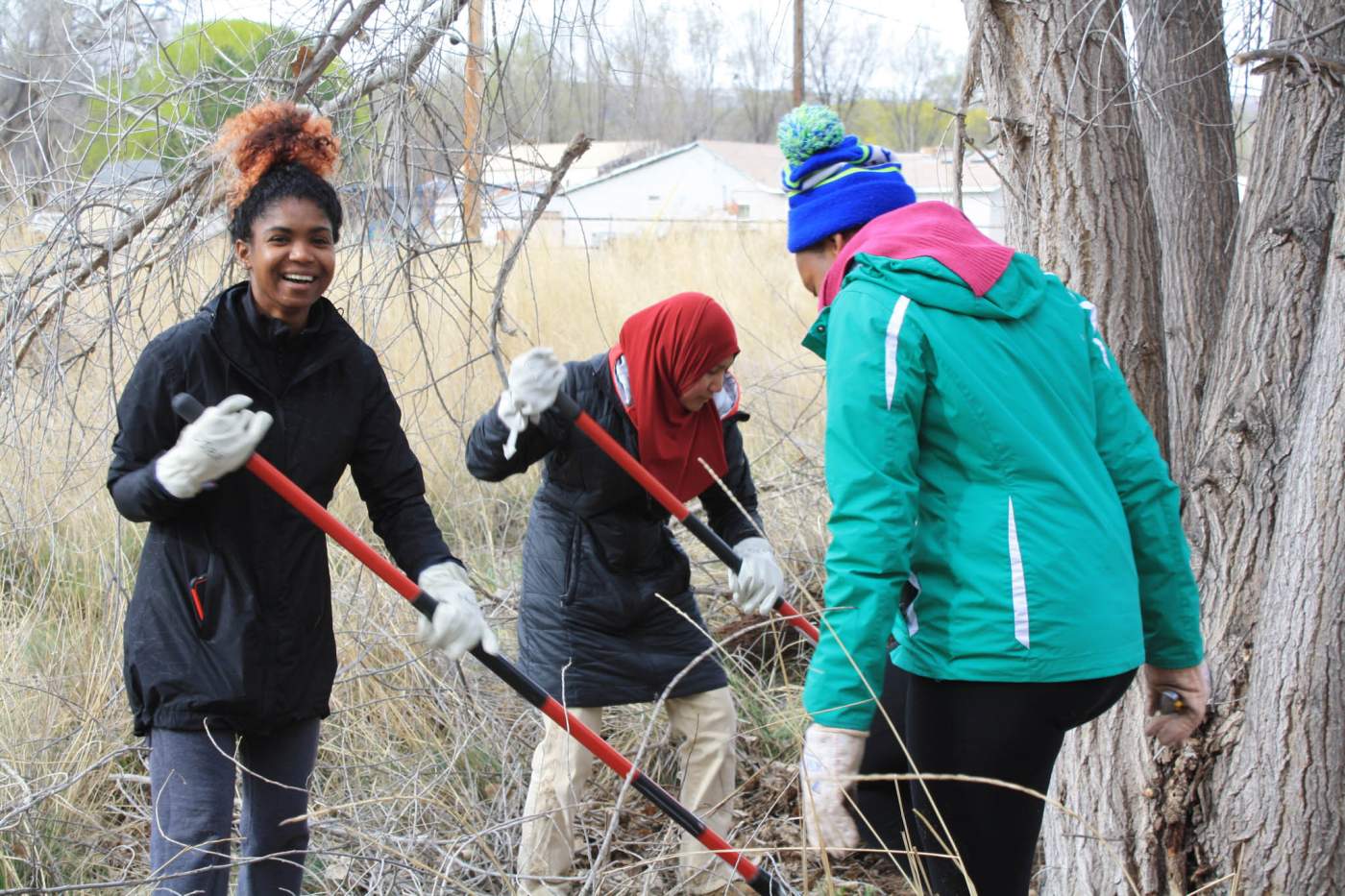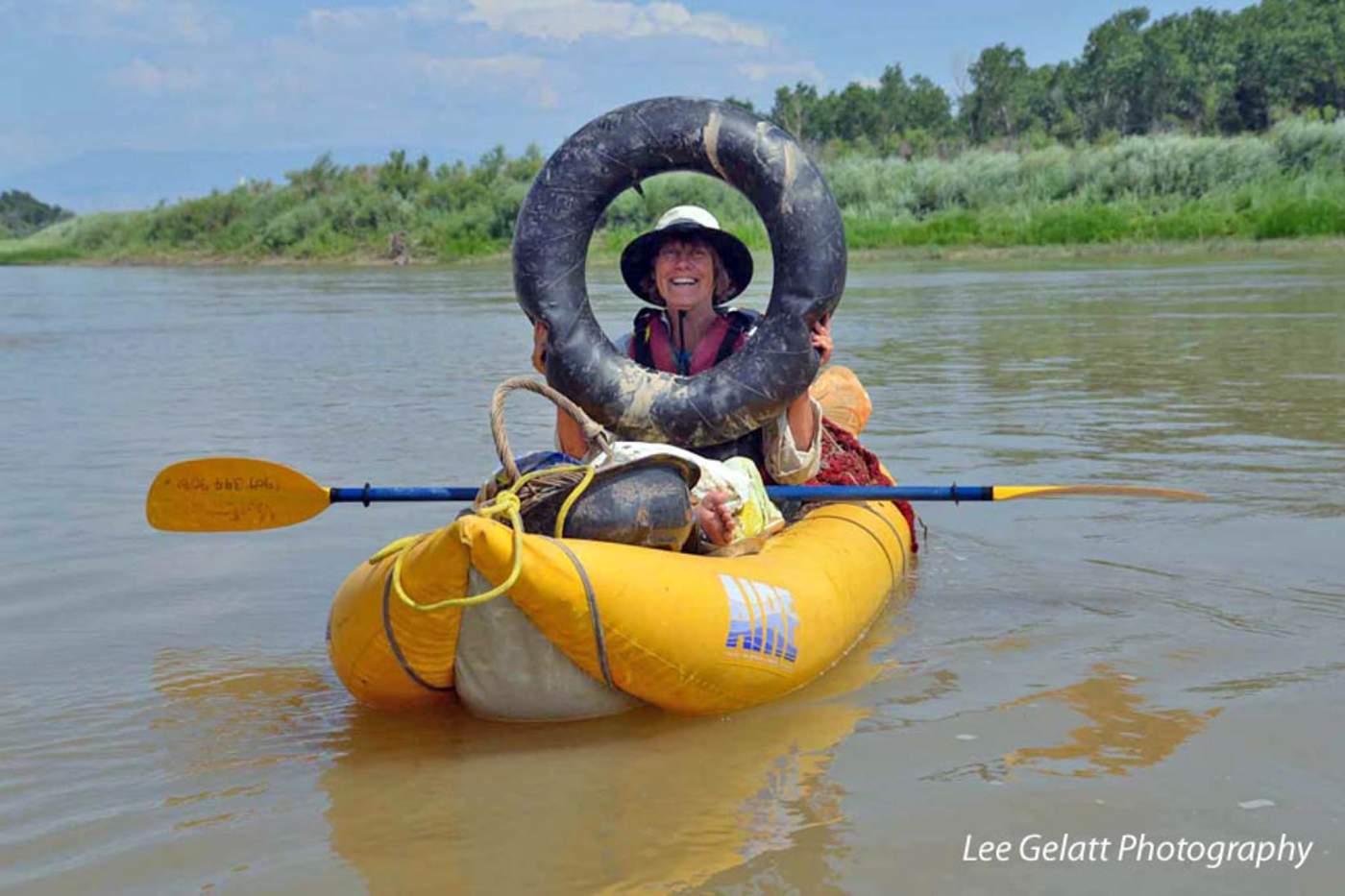River Stewardship
RiversEdge West works with numerous partners in Mesa County to restore riverside habitat. Typically, the first step of the process is removing invasive plants. After initial work is complete, ongoing stewardship (e.g. planting, monitoring, and maintenance) is a critical step that can help to ensure these sites are successful in the long term.
To protect our investment of resources and to ensure long-term ecological health, our River Stewardship Program is a more sustainable approach to:
- maintain these projects into the future
- engage the local community
- serve as a hands-on educational opportunity to answer questions and share knowledge with curious participants
The program blends the use of volunteers from the community to steward riverside areas in the Grand Valley, while incorporating education on the importance of our rivers, riverside habitat, and its correlation to healthy communities.
Join us for an upcoming volunteer event! Visit our event board or scroll down for our 2024 schedule.
2024 Volunteer Schedule
A list of dates and activities can be found below.

Click the links below for more information and to RSVP:
April 4, 2024: 9-11am - Volunteer Event at Connected Lakes with Colorado Parks and Wildlife
April 27, 2024: 9-11am - Volunteer Planting Event with the City of Grand Junction
May 2, 2024: 8-10am - Volunteer Event at Connected Lakes with Colorado Parks and Wildlife
May 29, 2024: 8-10am - Volunteer Event with Bureau of Reclamation
June 6, 2024: 8-10am - Volunteer Event at Island Acres with Colorado Parks and Wildlife
September 5, 2024: 9-11am - Volunteer Event at Connected Lakes with Colorado Parks and Wildlife
September 12, 2024: 9-11am - Volunteer Event with Bureau of Reclamation
Light snacks and coffee will be provided. Work will all be outside, so please bring water, proper work attire (we recommend pants, close-toed shoes, and long sleeves), and sun protection. Specialized tools will be provided, but you may also bring your own.
Activities will vary depending on the time of year, location, and need of land manager, but will typically include:
-
Mechanical weed treatment - Help is needed to manage tamarisk, Russian olive, and secondary weeds such as kochia (these troublesome weeds, if uncontrolled, become a tumbleweed that disperses seeds over a large area and displaces desirable vegetation), Russian thistle, and bull thistle.
-
Close social trails - A designated trail system, one that’s well planned, designed, constructed, and maintained, minimizes the human impact on the landscape that’s been conserved. Unfortunately, many “social trails” or informal trails created from foot traffic, have created impacts such as unnecessary vegetation/soil loss and fragmentation of flora/fauna habitats. Volunteers will help to close these social trails by spreading downed woody debris across the trails to discourage their use.
-
Cottonwood cage maintenance - Cottonwood trees perform many important functions, bolstering life both in and out of the water. As a keystone species, their roots help stabilize streambanks and the wood that falls into the channel provides cover for fish and other aquatic species. A cottonwood gallery provides shade and moderates stream temperatures, their branching structure and cavities that often result from heart rot in mature cottonwood stands provide nesting habitat for birds and cover for a variety of wildlife. Many cottonwoods at project sites have been wrapped with wire to protect them from beaver chewing. Some of the cottonwoods have outgrown their caging, while other cottonwoods that did not survive need their caging removed and passed on to other cottonwoods.
-
Cut pampas grass flowers/seed heads - Pampas grass is a tall, cool-season perennial bunchgrass that is a noxious weed in some Western states. It is noticeably becoming an issue in areas around Grand Junction. It reproduces readily by seed, and establishes in riparian, wetlands, and ditch habitats. By clipping and bagging the flower/seed heads, volunteers will reduce the potential pampas grass expansion at project sites.
-
Trash cleanup
-
Planting native plants - Equally important to managing invasive plants is helping to restore habitat with native plants and improve biodiversity. Planting events are chosen carefully at locations where plants have a higher chance of success (soil conditions, watering availability, and other micro conditions vary at each site and have a big impact on native planting success).
Partner with us on a Volunteer Event
If you or your business is interested in volunteering with us, please contact Nicole at Ncook@riversedgewest.org.
Volunteer activities may include pulling or cutting weeds using loppers or hand saws, caging cottonwoods, and planting native plants.
Other Volunteer Opportunities
- West Slope Outdoor Volunteers (WSOV) - WSOV is a regional stewardship collaborative that RiversEdge West is part of. On their website you can find a schedule of outdoor volunteer events in the region and other resources.
- Colorado Canyons Association (CCA) - CCA fosters community stewardship of our National Conservation Lands with a focus on Dominguez-Escalante, Gunnison Gorge, and McInnis Canyons National Conservation Areas in western Colorado.
- Wildlands Restoration Volunteers (WRV) - WRV completes many ecological restoration projects and offers numerous volunteer trainings in leadership and restoration skill development.
River Stewardship Sponsors and Supporters

River Stewardship Partners
RiversEdge West works closely with land managers to steward riverside lands including volunteer events open to the public. Our 2024 partners include Colorado Parks and Wildlife, the City of Grand Junction, and the Bureau of Reclamation.




